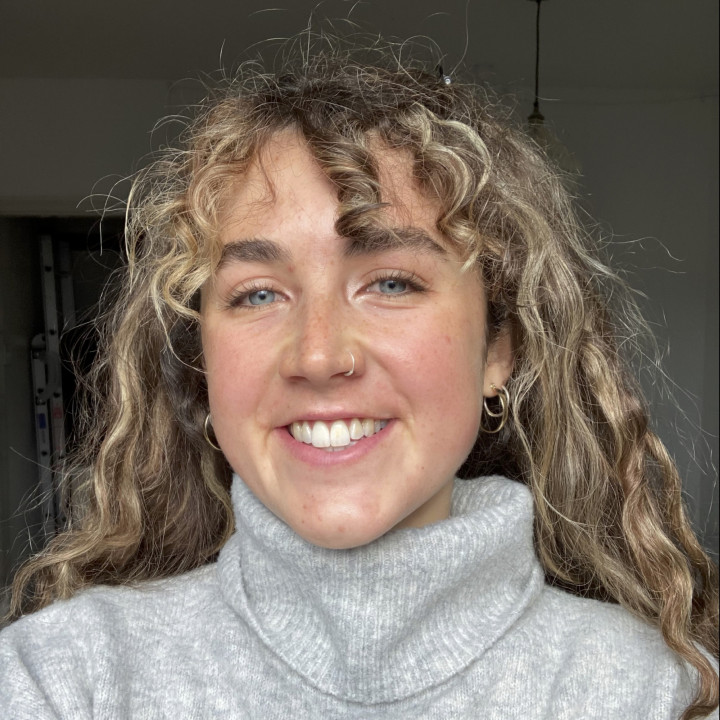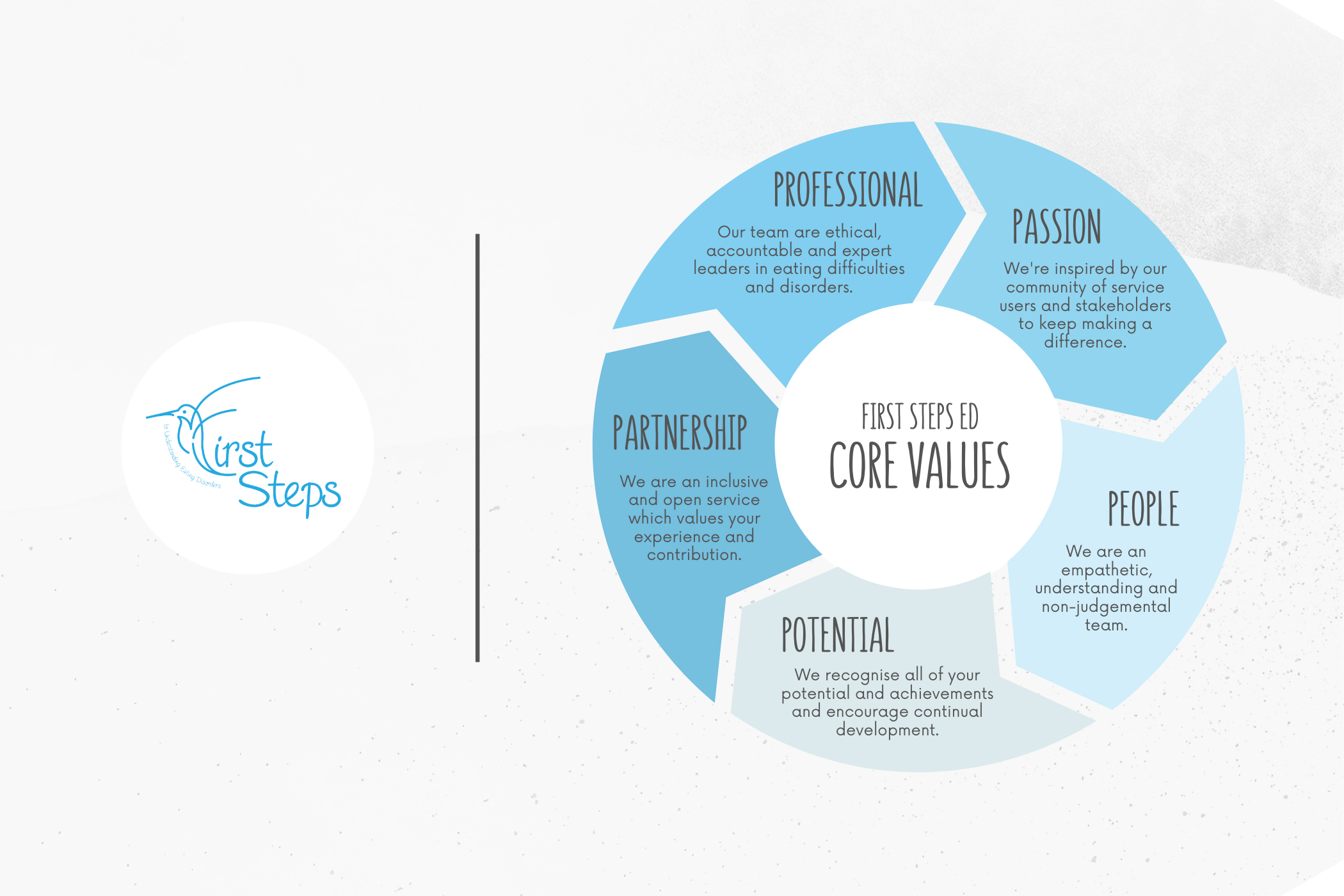Better Together: Our Working and Steering Groups.
Throughout the year our team will create and lead a number of working groups, designed to identify our strengths and opportunities, as well as recognise what we could be doing better.
Groups like these are invaluable to our service and make sure the voices and experiences of those with lived experience remains our focus. and key to everything we do here at First Steps ED. At the start of June we invited service users and stakeholders to join us for our latest steering group, and here’s a snapshot of what we heard…
–
Those attending were all pleased with the support available at First Steps ED and mentioned that accessing our services prevented them from relying on NHS services – with particular recognition for our Waiting Well, ICS and Finding Peace with Food (Nutrition) workshops and services.
The Impact of COVID:
Attendees highlighted a number of impacts the pandemic had on their recovery. Many faced relapse and found that the uncertainty and lockdowns made it difficult to engage in support and challenge their disordered eating behaviours. They also mentioned struggling with exercise addiction during this time, and other bad habits that went un-challenged for a long time.
The strain on healthcare and local GPs was also mentioned, and meant that accessing support through the NHS was much harder, with one of our service users mentioning that the lack of GP appointments gave their ED an excuse.
How First Steps ED has helped.
The group recognised a number of benefits of accessing First Steps ED, which includes:
- No diagnosis or criteria needed to access,
- Online delivery means recovery can be managed around work,
- The variety of support and service on offer,
- Accountability and an understanding that you can count on the support from First Steps ED when you need it,
- No pressure or threat to engage – service users have personal responsibility and the autonomy to refer and recover,
- Speaking to others who understand,
- Straight forward support from referral to disengaging.
The potential to improve.
- Better education and awareness for GPs.
There were a number of concerns around stigma, availability and a lack of understanding when it comes to local GP practices. All attendees discussed the need for increased training and awareness, with one mentioning that they receiving a First Steps ED talk whilst in nurse training which was helpful.
As a team, we recognise the importance of early intervention in the treatment of eating disorders. This is why we have a number of resources and training opportunities available to professionals throughout the year. Our CPD training modules are commissioned or funded by NHS providers and organisations in some areas, but available to book via Eventbrite.
- Better connections with CAMHS.
Whilst under CAMHS, patients are not always signposted to other supporting services – the group suggested this was also similar in adult ED services. Many agree that learning about First Steps ED earlier would have benefitted their recovery. Through our joined-up care approach, we do work hard to strengthen the relationships we have within the NHS and because of this, awareness of our services continues to grow.
- Increase community and campus presence.
All attendees agreed that multiple First Steps ED bases throughout throughout the UK would be a great way to increase the charity’s ability to support people, but also raise awareness and engage in community fundraising. This included a suggestion for the EDISS, to increase the presence of our services on campuses throughout the UK, with one attendee saying that “support would feel ‘less scary’ in a known place.”
To action this, we are already working with NHS providers throughout the UK to offer information and education around eating disorders and the support we offer. We also work closely with organisations, such as Student Space (of Student Minds), to ensure we have a presence in universities and colleges throughout the UK.
Some other suggestions included:
- Education for doctors, nurses and healthcare professionals, as well as children and in schools.
- Stronger links to NHS services and other MH service providers.
- An expansion of the EDISS service, and greater presence on university campuses.
- More awareness raised for First Steps ED, and fundraising initiatives that isn’t “exercise-related”, including options to anonymously get involved or donate.
- Collaboration and overlapping support with other addictions or conditions (drinking, co-morbidities, autism) of which are a trigger for an eating disorder, or disordered eating behaviours.
What about our groups?
Everyone had attended one or more groups and workshops, giving us an opportunity to explore feedback… Here’s what we heard!
- Following the end of covid restrictions in the UK, attendees agreed that there is a need for more in-person groups.
- A new ‘Relapse Drop In’ or relapse-focused group.
- Other group ideas include: LGBTQIA+, Boys and Men and creative options, including book clubs or an art club which would take the focus away from the ED.
- There was also the suggestion of an under 25 group to recognise the unique challenges faced by this age group.
How can we engage more as a community?
- A private FB community page (moderated by the First Steps ED team)
- Increased campaigns on social media to offer recovery challenges, fundraising, as well as increased engagement with children and families.
- Group meet ups across the country, similar to Sober Girls Society , with a First Steps ED rep in each city.
How would you feel about a new First Steps ED service, centred around Peer Support?
- One of the suggestions offered within this group was for ‘recovery buddies’, and the element of peer support which offers the opportunity of talking to someone further along in recovery.
- Many agreed that it is helpful to talk to someone who understands the feelings and thoughts involved and all believed that one-to-one support is extremely useful and important.
- Half of the group in attendance wished to learn more about how they could get involved in this potential new programme.
–
*A working group is a team of people who can bring the specialist skills and expertise to an upcoming project. At First Steps ED a working group could be a team of service users, or those with lived experience of mental health problems, working alongside staff and volunteers to make a dream-team. From time-to-time, we may also hold a steering group, which is similar in nature and plays a role in decision making. What makes a steering group different is its role in steering work undertaken by others… Those invited to our steering groups use their experiences, skills and knowledge of First Steps ED and mental health to help us make strategic decisions.
To learn more about future steering and focus groups, please get in touch with our team on info@firststepsed.co.uk

Contributed by Laura Evans,
Senior Specialist Support Officer at First Steps ED


